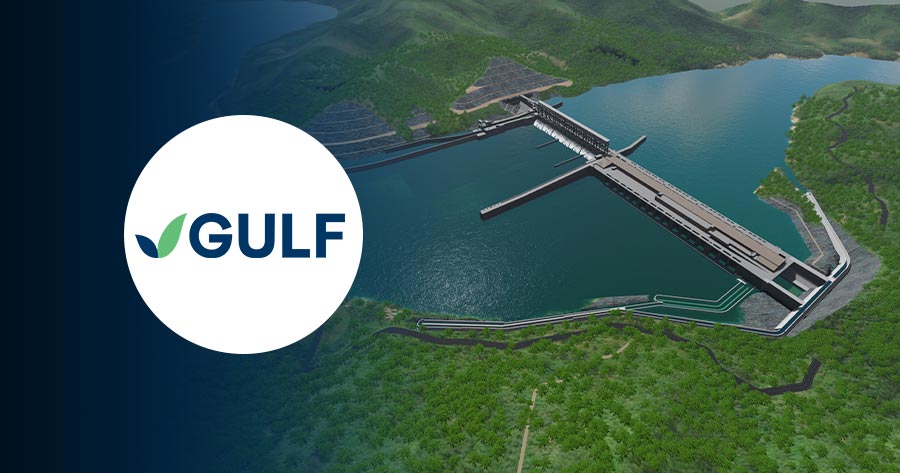Gulf Energy Development Public Company Limited (SET: GULF) has announced that the reference is made to GULF’s notification to the Stock Exchange of Thailand on April 25, 2022, whereby the company and China Datang Overseas Investment Co., Ltd. (CDTO) under China Datang Corporation Ltd., a state-owned enterprise and leading energy company of the People’s Republic of China with over 170,000 megawatts of installed power generation capacity covering 13 countries worldwide, have entered into a Tariff Memorandum of Understanding (Tariff MOU) with the Electricity Generating Authority of Thailand (EGAT) for the development of the Pak Beng Hydroelectric Power Project (Pak Beng project). The Pak Beng project, which is located on the Mekong River in Pak Beng district, Oudomxay province, Lao People’s Democratic Republic (Lao PDR), has an installed capacity of 912 megawatts, and will produce and sell all of the electricity it generates to EGAT.
The company announced that on September 13, 2023, Pak Beng Power Company Limited, a joint venture in which the company and CDTO hold 49% and 51% equity stake, respectively, to operate the Pak Beng project, has entered into a Power Purchase Agreement with EGAT for a period of 29 years from the commercial operation date with an average electricity tariff of 2.7129 Thai Baht per kilowatt-hour.
The Pak Beng project has a total investment cost of approximately THB 100,000 million and is currently in the process of securing loans from financial institutions, with the financial closing expected to be completed by the end of 2024. Construction is expected to take approximately 8 years to meet the scheduled commercial operation date in 2033.
The Pak Beng project has received approval from the government and National Assembly of Lao PDR, and it signed a Concession Agreement with the Lao PDR government on August 11, 2023. The Pak Beng project is one of the projects under the Memorandum of Understanding between Thailand and Lao PDR regarding cooperation on the development of electrical energy in Lao PDR (MOU) to promote decarbonization and increase the deployment of clean energy during the energy transition period. Under the MOU, electricity will be purchased from power projects developed in Lao PDR and transmitted through the cross-border electricity transmission system.
There is currently a framework for cooperation for the sale and purchase of electricity with a capacity of 10,500 megawatts, comprising 5,935 megawatts from 11 projects that have already started supplying electricity to the grid, 3,060 megawatts from 3 projects that have signed Power Purchase Agreements, and 815 megawatts from 2 projects that have signed Tariff MOUs.
The cooperation under the MOU also aligns with the Thai government’s policy to increase the proportion of clean energy power plants in the electricity grid to replace over 10,000 megawatts of capacity supplied by power plants that will reach the end of their lifespan from 2023 onwards. The Pak Beng project will also accommodate the increasing demand for electricity in the future from higher electric vehicle usage.
Furthermore, the purchase of electricity from the Pak Beng project will help reduce fuel price volatility and alleviate both household and industrial sectors’ electricity cost burden by using electricity at a low price throughout the contract period, as the Pak Beng project has a lower electricity production cost compared to the current average electricity price of 4-5 Thai Baht per kilowatt-hour.
In addition, the Power Purchase Agreement has stipulations on the proportion of raw materials and products from Thailand, as well as personnel, employment and services used during construction which will help stimulate economic development and employment in the country. Therefore, the development of the Pak Beng project is considered important to the country’s economic development and aligns with the government’s plan to purchase electricity from neighboring countries as specified in the national electricity purchasing plan.
The Pak Beng project is a run-of-the-river hydroelectric power plant which does not require the creation of a reservoir or the diverting of water from the Mekong river. It will therefore not impact the volume of water in the Mekong River. The Environmental and Social Impact Assessment (ESIA) for the Pak Beng project, which includes studies on sediment flushing, fish passages, resettlement for communities in Lao PDR located around the Pak Beng project area, and transboundary impacts, has already received approval from the Lao PDR government.
Furthermore, the Pak Beng project has established measures to prevent and mitigate impacts covering key issues that have been considered by the Mekong River Commission (MRC). These measures will help ensure that the development and operation of the Pak Beng project is undertaken in accordance with international standards and with responsibility towards the society, environment, and all relevant stakeholders.





